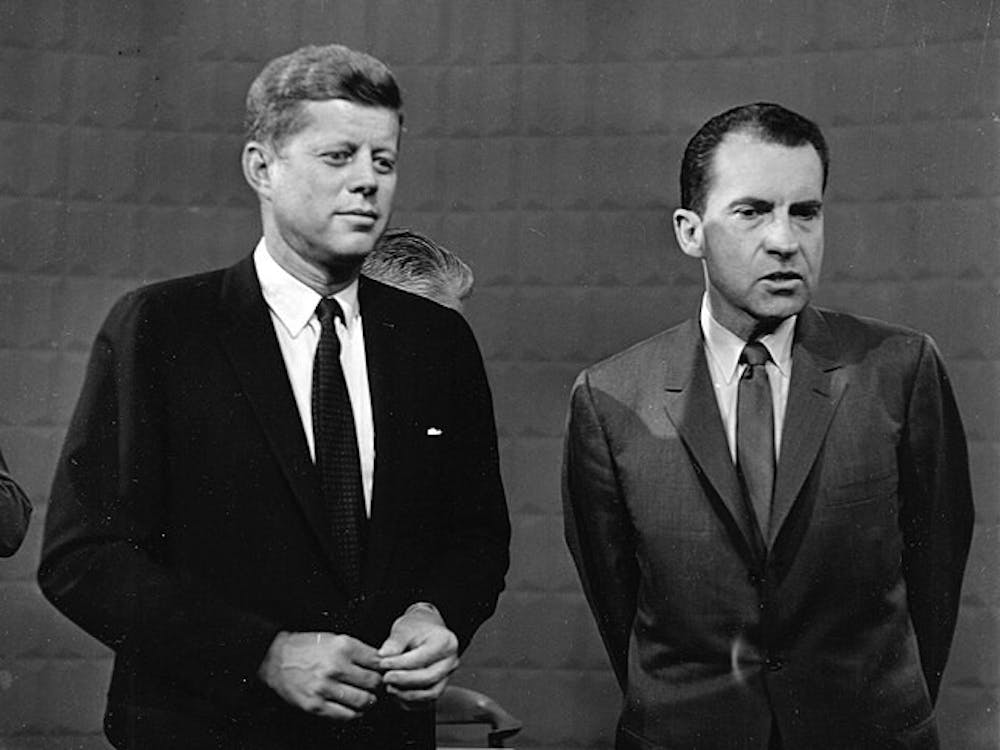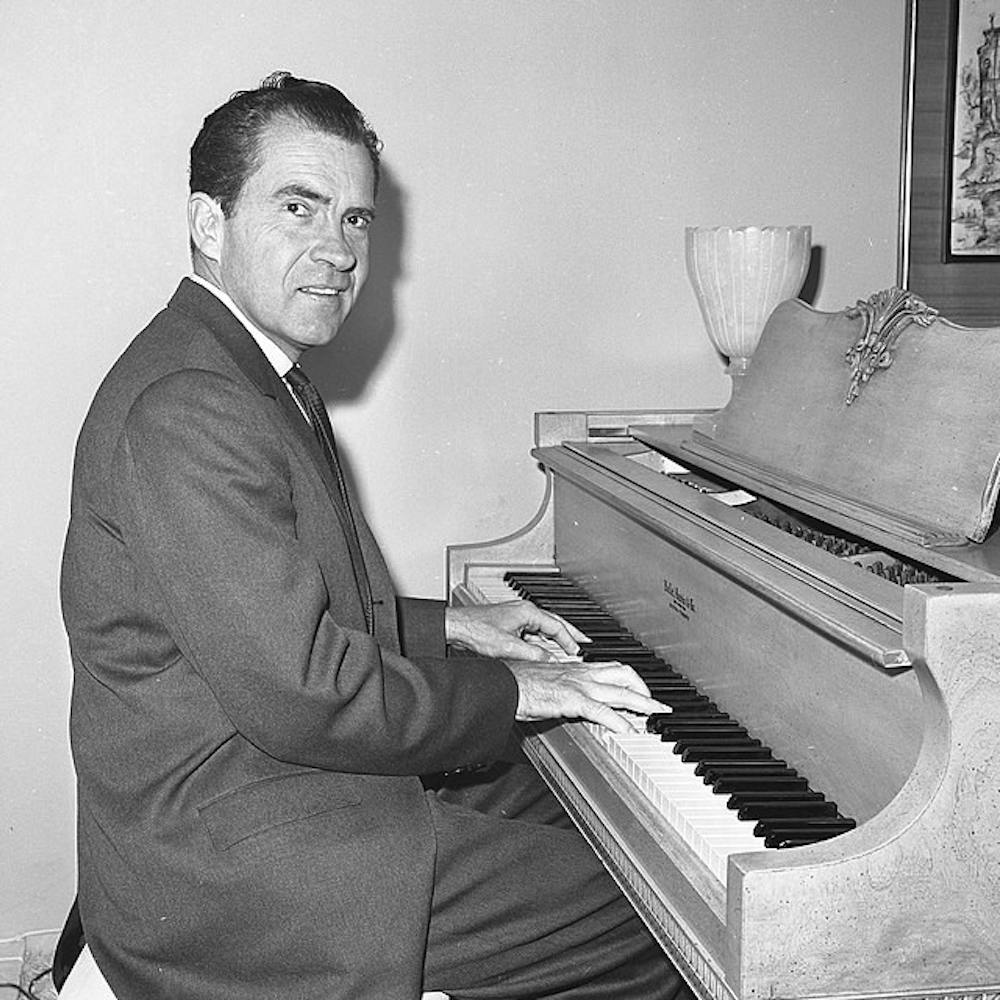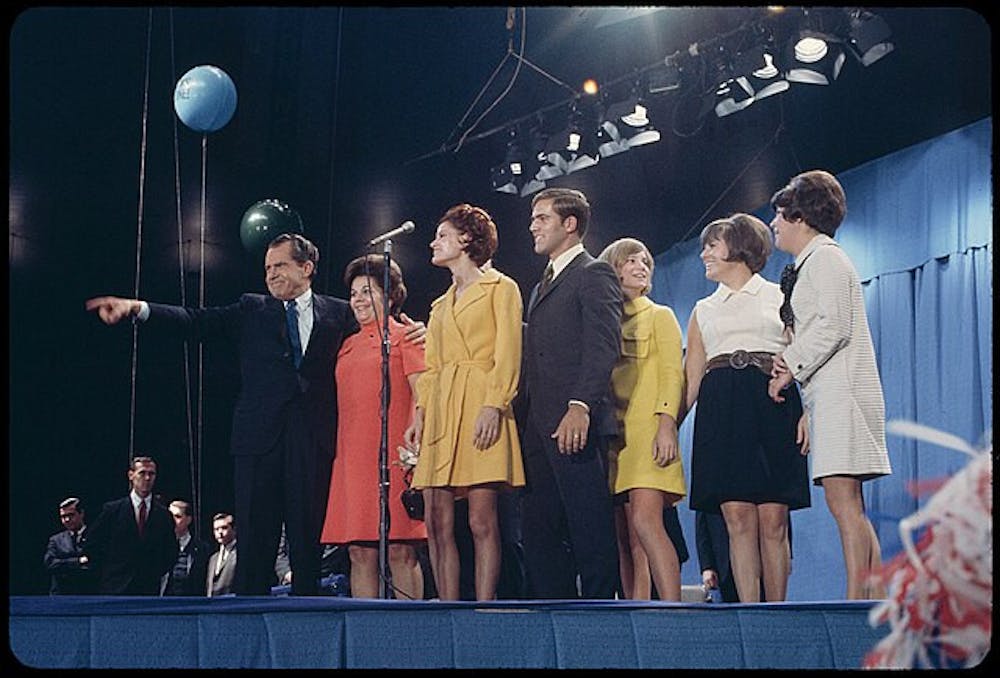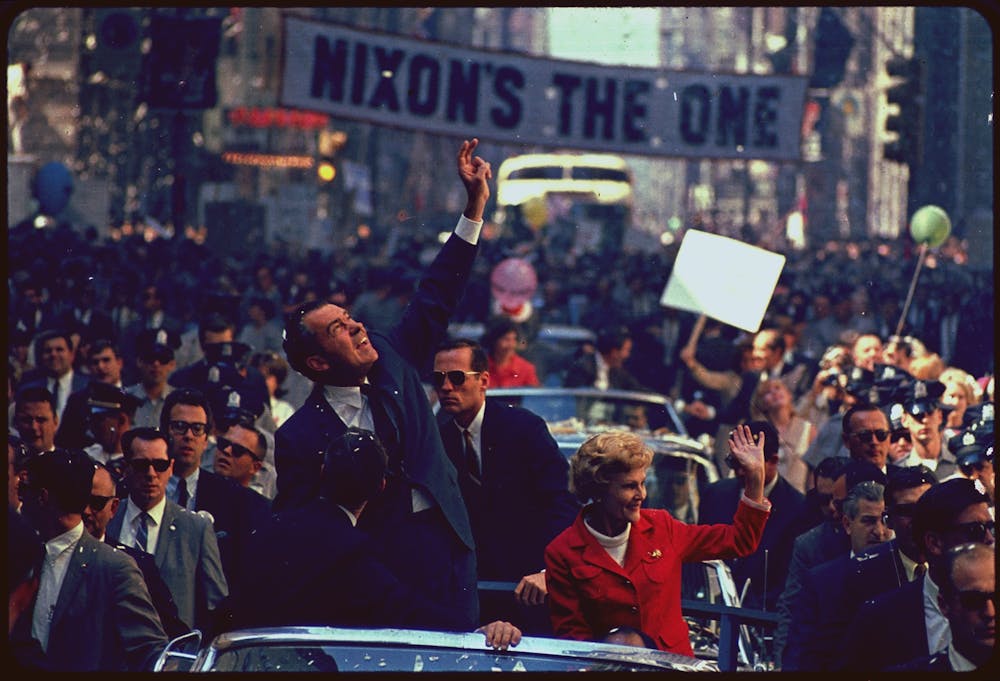Editor’s note: This article is one in a five-part series looking back on the life of one of Duke’s most infamous alumni — Richard Nixon. Read the previous installments on Nixon’s childhood and time at Duke and introduction to the political spotlight, with additional articles on his tumultuous presidency and eventual fall from grace to be published over the next week.
Embarrassing setbacks aside, 1952 turned out to be a good year for Nixon. The Eisenhower-Nixon ticket won the election in a landslide, 442 electoral votes to 89, sending the vice presidential hopeful to the White House just shy of his 40th birthday.
For the next eight years, Vice President Richard Nixon executed his duties well. While the president was recovering from a heart attack in 1955, Nixon used every opportunity to praise Ike and the team he was working with in his absence, and the vice president was commended across the board for his poise. It was a time he described as “drain[ing his] emotional as well as physical energies” but others saw as his “finest official hour.”
He earned clout by confronting Nikita Khrushchev, first secretary of the Soviet Union’s Communist Party, at the 1959 “Kitchen Debate.” When a hostile mob threw rocks at the vice president’s car while he was on a diplomatic mission in Peru in 1958, Nixon ordered Secret Service members to put away their guns so it did not turn into a riot.
There were hiccups and embarrassments along the way. One was when Duke faculty members voted 61-42 against granting the vice president an honorary degree for a 1954 commencement speech, a gesture typically extended to speakers. While the voting group represented only a small portion of Duke’s 606-member faculty at the time, the decision prompted Nixon to withdraw from the event and instead give a commencement speech at Whittier College, where graduating students received their diplomas in two lines — one for those who wanted to shake his hand and one for those who didn’t.

Regardless, Nixon would easily win the Republican nomination for the 1960 presidential election with Henry Cabot Lodge Jr. as his running mate. The only person standing between him and the presidency was Democratic nominee John F. Kennedy.
Kennedy and Nixon were not unfriendly. Kennedy’s father had quietly dropped off a $1,000 check for Nixon’s Senate campaign, and Kennedy invited Pat and Richard Nixon to his wedding with Jacqueline Bouvier. Secret Service members remember the vice president crying when “poor brave Jack” was near death after a risky back surgery. They were bunkmates once when they were freshman congressmen, and they spent the night sharing stories about their Navy service.
The ambassador’s son and the grocer’s son shared strange similarities. Both grew up under the shadow of demanding fathers and endured the devastating loss of an older brother in their early 20s. They served in the Navy — Kennedy as a war hero and Nixon as a logistician — and began their political careers as junior members of the House Committee on Education and Labor.
But the resemblance stopped there. Kennedy was charismatic, whereas the vice president was stiff. He could poke fun at himself; Nixon was humorless. The vice president could not afford to go to Harvard, but Kennedy, his father and his brothers joined elite final clubs at the university. Perhaps most grating of all, the press adored Kennedy.
Nixon’s unlovable reputation came back to haunt him, and few felt the need to mince their words. “If you vote for Nixon,” 76-year-old Harry Truman said at a rally, “you ought to go to hell.”
"If Americans viewed John F. Kennedy as their shining hero," wrote biographer Christopher Matthews, "they also recognized the five o'clock shadow of Richard Nixon in the fluorescent light of their bathroom mirror."

* * *
One could say Nixon lost the presidency because of a limousine door. Still recovering from a recent hospital stay after his vehicle’s door crushed his left knee, Nixon, underweight and pale, banged the same knee upon arriving at the studio for his first debate with Kennedy — the first televised presidential debate in history. The Republican candidate refused to wear makeup because he thought he would look feminine, and his shifty eyes and sweaty face made the tanned, rested and ready Kennedy look even better in comparison.
Nixon was not particularly impressive on content either. His opening remarks were mostly a response to Kennedy rather than a forceful establishment of his own platform, and the points he managed to eke out were obfuscated by statistics.
It was clear that Nixon lost. Even Lodge agreed. “That son-of-a-b--- just lost us the election!” he yelled at the television.

Nixon would wear makeup and gain weight before the rest of the presidential debates; he won the next one and drew the last two. Polls showed Kennedy had a slight edge, but Nixon was slowly closing in by October.
Then the Nixon campaign blinked. On Oct. 19, authorities arrested Martin Luther King Jr. at an Atlanta sit-in, and a Georgia judge sentenced him to four months of hard labor on a state road gang for a prior, unrelated misdemeanor within the week. Coretta King, six months pregnant at the time, told Kennedy aide Harris Wofford that she feared for her husband’s safety.
Get The Chronicle straight to your inbox
Sign up for our weekly newsletter. Cancel at any time.
Convinced by his brother-in-law Sargent Shriver, Kennedy called Coretta King to offer his support and made a personal call to the governor of Georgia on behalf of the Kings. His brother Robert F. Kennedy demanded the judge who sentenced King set him free, and 12 days before the election, King returned home.
And what did the Nixon campaign say?
“No comment.”
While he privately asked that the attorney general look into the case, Nixon believed that publicly speaking out on behalf of the civil rights activist while he was courting Southern white voters was too risky of a gamble. Eisenhower also had no desire to interfere. Nixon was later quoted telling an associate that “it would be completely improper for [Kennedy] or any other lawyer to call the judge, and Robert Kennedy should have known better than to do so.”
King’s father had once endorsed Nixon — but frustrated by the Republican’s inaction, the Baptist minister said:
“I’ll take a Catholic or the Devil himself if he’ll wipe the tears from my daughter-in-law’s eyes. [Kennedy] has the moral courage to stand up for what he knows is right. I’ve got all my votes, and I’ve got a suitcase, and I’m going to take them up there and dump them on his lap.”
The elder King’s speech helped quell anti-Catholic sentiment among Black Baptist voters, and the two phone calls by the Kennedy brothers marked a turning point in the election. Kennedy’s campaign sent a slew of “blue bomb” brochures into majority-Black neighborhoods across the nation: “‘NO COMMENT’ NIXON VERSUS A CANDIDATE WITH A HEART, SENATOR KENNEDY.”
Five hundred thousand “blue bombs” would go to Chicago alone, and the Kennedy campaign would send another wave of pamphlets in front of Black churches the Sunday before the election. The Democrat would carry 80% of the vote from Chicago’s predominantly Black neighborhoods, eking out an 8,858-vote win in Illinois. If Kennedy had received the same share of votes as Democratic presidential candidate Stevenson in 1956, he would have lost Illinois and likely Michigan, New Jersey and Pennsylvania — and Nixon would have won.
* * *
Having promised to visit all 50 states early in the campaign, Nixon spent the last week of the election in Alaska, courting all three of its electoral votes. While his opponent spent time in states that were solidly blue or with few electoral votes, Kennedy went to Pennsylvania and Michigan.
On Election Day, Nixon voted, went to the beach, had lunch and went to his hotel to watch the results tick in. Connecticut went to Kennedy. Then New York. Then Texas by 46,000 ballots. California was too close to call (Nixon would narrowly win his home state). Pennsylvania went blue, as did Michigan. Illinois was Nixon’s … until the last batch of votes from Chicago came in and gave Kennedy a slim lead. Minnesota went blue. Nixon conceded.
Kennedy had won, 303 electoral votes to Nixon’s 219.
For all his mistakes, Nixon did well. Kennedy won the popular vote by less than 1%, and Nixon had captured more states and congressional districts. Eisenhower had abbreviated his campaigning schedule for Nixon out of health concerns. Kennedy’s vice presidential pick, Lyndon B. Johnson, was a more charismatic campaigner than Lodge, and the Texan’s home state was worth 24 electoral votes. Nixon’s opponent was younger, richer and simply easier to like than he was.
Nixon’s staff encouraged him to pursue recounts amid accusations of voter fraud. Johnson was close with George Parr, the head of the Democratic political machine in Texas’ Duval County, and “Landslide Johnson” had won on questionable results before. Kennedy’s narrow victory was largely attributed to his 320,000-vote win in Cook County — the county of Chicago, where voter fraud ran rampant. If those two states went to Nixon, he would have 270 electoral votes, just enough to win him the presidency.
But Nixon did not. The 46,000-vote margin in Texas was too large to fight, and Democrats could challenge Nixon results in other states with a lower margin of victory, including California. (Most historians agree that any potential voter fraud would not have been enough to win Nixon the election, and official recounts of Cook County ballots did not find significant evidence of alleged irregularities). Demanding a recount would likely only harm his political career when he was still trying to shed his “Tricky Dick” persona.
Publicly, he gracefully accepted the results. Privately, he fumed. Nixon “believed until the day he died that Kennedy had stolen the election,” said Alexander Haig, who later served as Nixon’s chief of staff. It was the first time he had lost an election. His amicable relationship with Kennedy was over.
His whole life, he hated people who had it easy — the people who were born into the right families with the right personalities and with the right amount of cash in their bank accounts, while he had to claw and fight for everything he had. It was this resentment that inspired the Checkers speech and emboldened him to pursue Hiss. Now the same people he despised made him a political eunuch, and he could not forgive them for it.
The night of Kennedy’s inauguration, Nixon went out on a balcony overlooking his “favorite view in the world.” He would recall, as he looked down at the National Mall, that a thought “rushed into my mind — not consciously, but then it seemed almost to overwhelm me.”
“I’ll be back.”
An impossible dream
The Nixon family returned to California. The former vice president began practicing law once more and wrote “Six Crises,” his first memoir. Though initially reluctant, Nixon ran for California governor in 1962 in hopes of revitalizing his political career with a victory. He lost by over five percentage points to incumbent Democrat Pat Brown.
As the results came in and it was clear that Nixon would lose, press secretary Herbert Klein told a crowd of reporters that the candidate would not give remarks to him that night. Then Nixon appeared. He nudged Klein aside, put his hands in his pockets, thrust out his chin and said:
“Now that Mr. Klein has made a statement, now that all the members of the press are so delighted that I lost, I would just like to make a statement of my own.”
He believed in a free press, he said. “I think each of you covered it the way you saw it.” Carl Greenberg was the “only reporter on The Times who wrote every word that I said. He wrote it fairly. He wrote it objectively.”
Ever since the Hiss case, he told the reporters, “You’ve had a lot of fun — a lot of fun — [and] you’ve had the opportunity to attack me.”
“I leave you gentlemen now and you will now write it. You will interpret it. That’s your right,” he continued. “But as I leave you, I want you to know — just think how much you’re going to be missing.”
“You won't have Nixon to kick around anymore because, gentlemen, this is my last press conference.”
* * *
For the next six years, Nixon roamed the political wilderness. He became a senior partner at Nixon, Mudge, Rose, Guthrie & Alexander. His younger daughter, Julie, wrote in her diary that “Daddy is nice and busy and seems happy.”

Meanwhile, Johnson pushed a slew of progressive legislation through Congress using the goodwill generated by his predecessor’s assassination in 1963, and the former vice president pledged not to send American soldiers to Vietnam during the 1964 election — a promise he did not keep. By 1966, 385,300 American boys would be in South Vietnam.
Nixon scratched his political itch. Republicans suffered heavy losses in Congress in the 1964 elections as their presidential candidate, Barry Goldwater, lost soundly to Johnson. The former vice president, who had loyally campaigned for Goldwater, campaigned for the Republicans once again in 1966.
The Republicans gained 47 seats in the House and three in the Senate, and Nixon was given the lion’s share of the credit. Spectator columnist Murray Kempton called it “Lazarus laughing.”
In 1966, Pat had told Julie “flatly, almost tonelessly,” that she could not face another excruciating campaign. On Jan. 15, 1968, Richard Nixon told his family that he was running for president.
The Nixon family made “the awful decision” to stand by their patriarch once more.
* * *
Nixon had been at this apex before. One humid Florida night, he stood before a roaring crowd, as he did eight years earlier in Chicago, and accepted the Republican nomination for president.
“This time there is a difference,” he promised. “This time we are going to win.”
The men and women who watched Nixon’s Checkers speech were now grandparents whose sons had landed at Incheon and whose grandsons had died in Đăk Tô. Those same people, who drove Chevys and watched football on Sundays, saw chaos when they turned on their family televisions. They could not recognize the America of “Mr. Smith Goes to Washington.”
No, it was the America of “The Graduate” — one where there was not a day when its citizens “haven't read or heard a report of the American flag being spit on, an embassy being stoned, a library being burned or an ambassador being insulted some place in the world,” Nixon said.
“As we look at America, we see cities enveloped in smoke and flame. We hear sirens in the night. We see Americans dying on distant battlefields abroad. We see Americans hating each other; fighting each other; killing each other at home. And as we see and hear these things, millions of Americans cry out in anguish,” he said.
“Did we come all this way for this? Did American boys die in Normandy, and Korea, and in Valley Forge for this?”
“Listen to the answer to those questions,” Nixon told the crowd. “It is another voice. It is the quiet voice in the tumult and the shouting.”
“It is the voice of the great majority of Americans, the forgotten Americans — the non-shouters; the non-demonstrators.” It was the voices of grocers’ sons and their wives with Republican cloth coats.
“They are not racists or sick; they are not guilty of the crime that plagues the land. They are black and they are white — they're native born and foreign born — they're young and they're old,” he said. “… They are good people; they are decent people. They work, and they save, and they pay their taxes and they care.”
He saw a child, who “sleeps the sleep of childhood and he dreams the dreams of a child. And yet when he awakens, he awakens to a living nightmare of poverty, neglect and despair.”
The child “fails in school.” He “ends up on welfare.” America “feeds his stomach and starves his soul. It breaks his heart. And in the end, it may take his life on some distant battlefield.”
It didn’t matter if that child was Black, or white, or Mexican, or Italian, or Polish, Nixon said. That child was an American and “everything we ever hoped to be and everything we dare to dream to be.” He was “more important than any politician’s promise.” And America, the richest and most powerful nation in the world, was failing him.
He saw another child that night. “He hears the train go by at night and he dreams of faraway places where he'd like to go. It seems like an impossible dream.”
“But he is helped on his journey through life,” Nixon said. A father who quit school in sixth grade to work for his family and sacrificed everything for his boys. A mother with a gentle heart who wept when he went away to war, but “understood why he had to go.”
The child relied on his teacher, his football coach, his minister — and his loyal wife and children who “stood by him in victory and also defeat.” He would go into politics, and then there would be “scores, then hundreds, then thousands, and finally millions” who would be true to him.
“And tonight he stands before you — nominated for President of the United States of America.”
“You can see why I believe so deeply in the American Dream. For most of us, the American Revolution has been won; the American Dream has come true,” he said. “And what I ask you to do tonight is to help me make that dream come true for millions to whom it's an impossible dream today.”
In one speech, Nixon presented himself as the candidate for unity in the face of chaos, peace in the face of war, strength in the face of weakness. He told that crowd that he was one of you.
That night, Nixon was sleepless. He spent the wee hours nursing a drink and speaking to an aide.
None of his establishment critics could write a speech like that, he said. He could. Ike could. They both “started with nothing.”
“They won’t like that speech, will they? The New York Times and those boys,” Nixon said. “F--- ‘em.”
“They call me intelligent and cool [with] no sincerity, and then it kills them when I show ’em I know how people feel,” he said.
* * *
“Law and order” became the central issue for Nixon’s campaign. The Republican candidate stood for stability: the antithesis to hippies with long hair, back-alley abortions, poor people’s marches, burning American flags, poorly behaving teenagers, pornography, dope, urban riots, rising taxes, weed, casual sex, campus protesters and Black Panthers.
“There can be no progress without order, no freedom without order, no justice without order,” he said.
Nixon is by no means the only presidential candidate to campaign on condemning violence and seeking order — the strategy was especially common in the ‘60s when crime rates had skyrocketed. But the presidential hopeful went further.
His team refined Goldwater’s “Southern strategy,” a subtle affirmation that white Southerners dissatisfied with the Civil Rights Movement had a man on their side. Dog whistles like mentions of “states’ rights” tapped into existing resentments over busing and civil rights legislation.
Harry “Bob” Haldeman, Nixon’s chief of staff, later stated that the Southern Strategy "emphasized that you have to face the fact that the whole problem is really the Blacks. The key is to devise a system that recognized this while not appearing to."
* * *
Nixon also could not ignore the Vietnam War. Instead, he attempted to delay South Vietnamese participation in the Paris Peace Talks, an act that Johnson called “treason.”
Five days before the election, Johnson announced that he would temporarily cease bombings in Vietnam, a step towards peace negotiations and a threat to a Nixon victory. Nixon surrogates Anna Chennault, a war correspondent and prominent member of the U.S. China Lobby, and South Vietnamese ambassador Bui Diem worked to convince South Vietnamese President Nguyen Van Thieu that he would receive more favorable peace terms under a Nixon presidency.
When negotiations hit a stumbling block and a businessman tipped Johnson off about the Nixon campaign’s machinations, Johnson was furious. Wiretaps by the U.S. government confirmed that Chennault and Bui Diem were interfering with Johnson’s plan for peace, but the president lacked definite confirmation of Nixon’s involvement. Nixon denied that he would ever interfere with the peace process.
“Good God, we want them over in Paris. We’ve got to get them to Paris or you can’t have a peace,” Nixon told Johnson.
Yet the Republican candidate running as the candidate for peace had not only known about what became known as the Chennault Affair but had actively encouraged interference. Haldeman’s notes from the campaign showed that Nixon had ordered him to “Keep Anna Chennault working on SVN,” and that the candidate had asked “Any other way to monkey wrench it? Anything RN can do.”
“We could stop the killing out there,” Johnson said to Everett Dirksen, the Republican Senate leader. “But they’ve got this … new formula put in there — namely, wait on Nixon. And they’re killing four or five hundred a day waiting on Nixon.”
The peace talks fell through, and Nixon won 301 electoral votes to Democrat Hubert Humphrey’s 191 and independent George Wallace’s 46.

In hindsight, it’s unclear if Johnson’s Hail Mary would have resulted in successful peace talks, even without the Nixon’s campaign’s interference. But what is clear is that Nixon willingly broke the law for personal gain and that those around him abetted and covered his tracks for decades. It was a dangerous pattern, one he and his colleagues fell into time and time again when he assumed the presidency.
“For [Johnson and his aides], a moment of genuine hope — improbable perhaps, but nevertheless hope — was stolen,” wrote biographer John A. Farrell. “Given the lives and human suffering at stake, and the internal discord that was ripping the United States apart, it is hard not to conclude that, of all of Richard Nixon’s actions in a lifetime of politics, this was the most reprehensible.”
Editor’s note: Much of the information for this article was sourced from Farrell’s 2017 book “Richard Nixon: The Life,” Stephen E. Ambrose’s 1987 book “Nixon, Vol. 1: The Education of a Politician, 1913-1962” and Ambrose’s 1989 book “Nixon, Vol. 2: The Triumph of a Politician, 1962-1972.”

Audrey Wang is a Trinity senior and data editor of The Chronicle's 120th volume. She was previously editor-in-chief for Volume 119.

